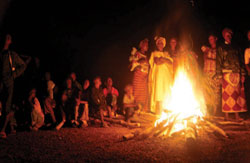Could you forgive someone who committed atrocities to you, your family and your community? That was the question posed in the documentary, Fambul Tok, which was screened in Pollak Theatre on March 5 as part of On Screen In Person (a film series where directors present their films and partake in Q&A’s).
On Screen In Person was sponsored by the Department of Communication and Center for the Arts and funded by the National Endowment of the Arts’ Regional Touring Program.
Andrew Demirjian, specialist professor of communication, welcomed everyone and introduced director Sara Terry. He said Terry has won a number of awards and is founder of the Aftermath Project, a non-profit organization that allows photographers to capture images in post-war countries. Demirjian said, “I am excited to watch this with you and have a great discussion.”
Terry thanked the audience and said the film was “a very specific post-conflict story” and asked, “What does it mean to be human?” Terry added, “I think the film is best experienced the way it was edited.”
Fambul Tok focused on villages in Sierra Leone, Africa, where fambul tok, or family talk, is used to forgive people for actions committed during its civil war (1991- 2002). Performed around a bon fire at night, victims and attackers face each other in the hopes of amending relations. Individuals are also recorded talking about their past experiences before their fambul tok ceremony. The film also featured John Caulker, founder of Fambul Tok, as he traveled around the country and tried to help bring peace to these communities. (He’s presented as a strong worker and inspiration for fixing his country through this “old tradition.”)
Fambul Tok was an anthropological journey into an unfamiliar tradition. Watching people offer pleas of mercy for their deeds in order to heal wounds was quite eye-opening. Since victims and attackers live together, it makes these rituals stand out as strong confrontations to unite the community. Terry captured fambul tok at night well enough to get caught up in it. Although it could be hard to see by the fire, it added to the drama as viewers listened (or read the subtitles) more closely to these discussions. While Fambul Tok is concerned with this tradition, Terry also offered audiences background information on the civil war that rocked the country. This gave viewers a basis of what happened and why people feel divided.
Like any good documentary, the film is balanced. We hear stories from victims hurt or scarred by rebels and how it changed their lives as well as those forced into joining the rebels. Terry captured the rift that divided villagers and offered a sense of curiosity to how they would reconcile over fambul tok.
For instance, Sahr and Nyumah were friends before the civil war erupted, but Nymuah badly damaged Sahr’s leg and killed his father. After hearing each talk, it was quite emotional when Sahr and Nyumah reconciled their past and recaptured their friendship. The power of fambul tok was solidified here and in other instances.
For some, though, it’s not so easy, like Naomi Joe who lives with the actions her brother, Tamba Joe, committed. Her struggle to fix relations with her village became a deep story later. (When Caulker searches for Tamaba, the movie became intense as they scoured all over for him.) Terry also interviewed Captain Mohammed Savage or “Mr. Death,” as he denied involvement or actions in these travesties despite being despised by the village of Foendor. It’s tough to look at him and his blank expression without thinking he had nothing to do with this. However, Terry left enough mystery to feel like there was the possibility for a change of heart.
Fambul Tok was a fascinating look into a simple, deep and unique custom. Terry captured the difficulty of moving forward while progressing with one act of forgiveness after another.
During the Q&A, Terry discussed a variety of topics from working on the film to the ideals of fambul tok.
A man asked, “To what extent could this process be implemented to other parts of the world?” Terry answered it was common in Africa but is also seen in cultures such as Asian and Eskimo. She said, “We found and learned something new about other cultures.”
Later, one woman asked about reconciliation, and Terry explained in Africa, “If you come to somebody and said I did this… the cultural response is ‘I’m sorry, I forgive you.’ Reconciliation comes later.”
Demirjian said the movie “is like the flip-side of narrative filmmaking,” where people’s lives and not the conflict is the focus. Demirjian then asked, “Did you take a cinema verite-style approach to your filmmaking?” Terry responded, “Sometimes we could and sometimes we couldn’t. We came up with as many ways of making” the film this way.
When The Outlook asked Terry how she came across this subject, she said she learned about it while she was in Sierra Leone in 2006, hearing stories about people asking for forgiveness. She was educated about it from a native, who said after the conflict, “we want peace.”
After the event, The Outlook also asked if Terry was nervous when she met Savage. “I was shaking the first time I saw Savage. I knew of Savage since 2006,” Terry said. She continued that when she interviewed Savage and listened to him not admit to anything, Terry said she had the thought, “I think you want to be a different man.”
Ian Silakowski, a radio/TV major, said, “[Fambul Tok] was very influential and enlightening. I’ve seen documentaries like this before but it still gets you.”
Hannah Dove, of Neptune who came to America from Sierra Leone in 1978, said the film was “very disconcerting” and added she has family in the region. She said her mother was “a native and most of what you saw, the people saw.” As for the film’s topic, Dove said, “Fambul Tok has been practiced for many years.”
This year’s final On Screen In Person film is Blast! on April 9 in Wilson Auditorium.
PHOTO COURTESY of onscreeninperson.com




